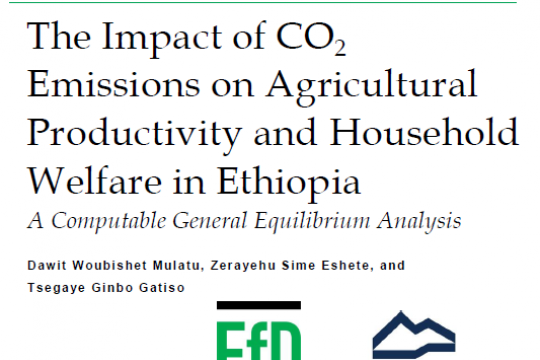Climate change has become one of the most important development challenges worldwide. It affects various sectors, with agriculture the most vulnerable. In Ethiopia, climate change impacts are exacerbated due to the economy’s heavy dependence on agriculture. The Ethiopian government has started to implement its Climate Resilient Green Economy (CRGE) strategy, which is planned to foster development and sustainability while limiting GHG emissions by 2030. However, to the best of our knowledge, research on estimating the economic impacts of CO2 emissions are limited. Moreover, studies estimating the productivity and welfare effects of Ethiopia’s target for reducing emissions in line with the CRGE are lacking. Therefore, this study aims to fill these significant research and knowledge gaps using a recursive dynamic Computable General Equilibrium (CGE) model to investigate CO2 emissions’ impact on agricultural performance and household welfare. We simulate CO2 emissions-induced variation in agricultural total factor productivity for the period 2010– 2030. The simulation results indicate that CO2 emissions negatively affect agricultural productivity and household welfare. Compared to the baseline, real agricultural GDP is projected to be 4.5 percent lower in the 2020s under a no-CRGE scenario. Specifically, CO2 emissions lead to a decrease in the production of traded and non-traded crops, but not livestock. Emissions also worsen the welfare of all segments of households, where the most vulnerable groups are the rural-poor households. Results also suggest that proper implementation of the CRGE strategy can significantly reduce the adverse effects of GHG emissions on agricultural productivity and household welfare.
The Impact of CO2 Emissions on Agricultural Productivity and Household Welfare in Ethiopia: A Computable General Equilibrium Analysis
EfD Authors
Country
Sustainable Development Goals

